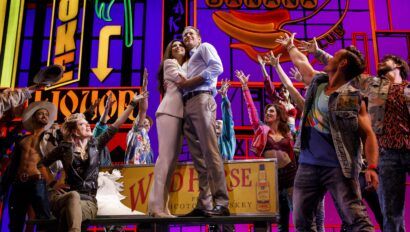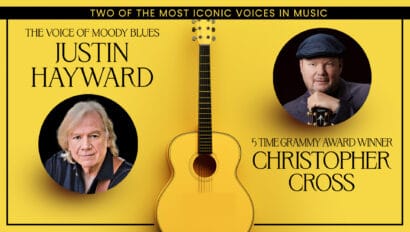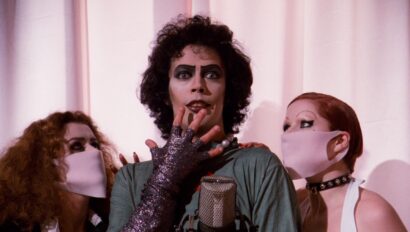Behind the Scenes with Sharon Hart and the WYSH Project
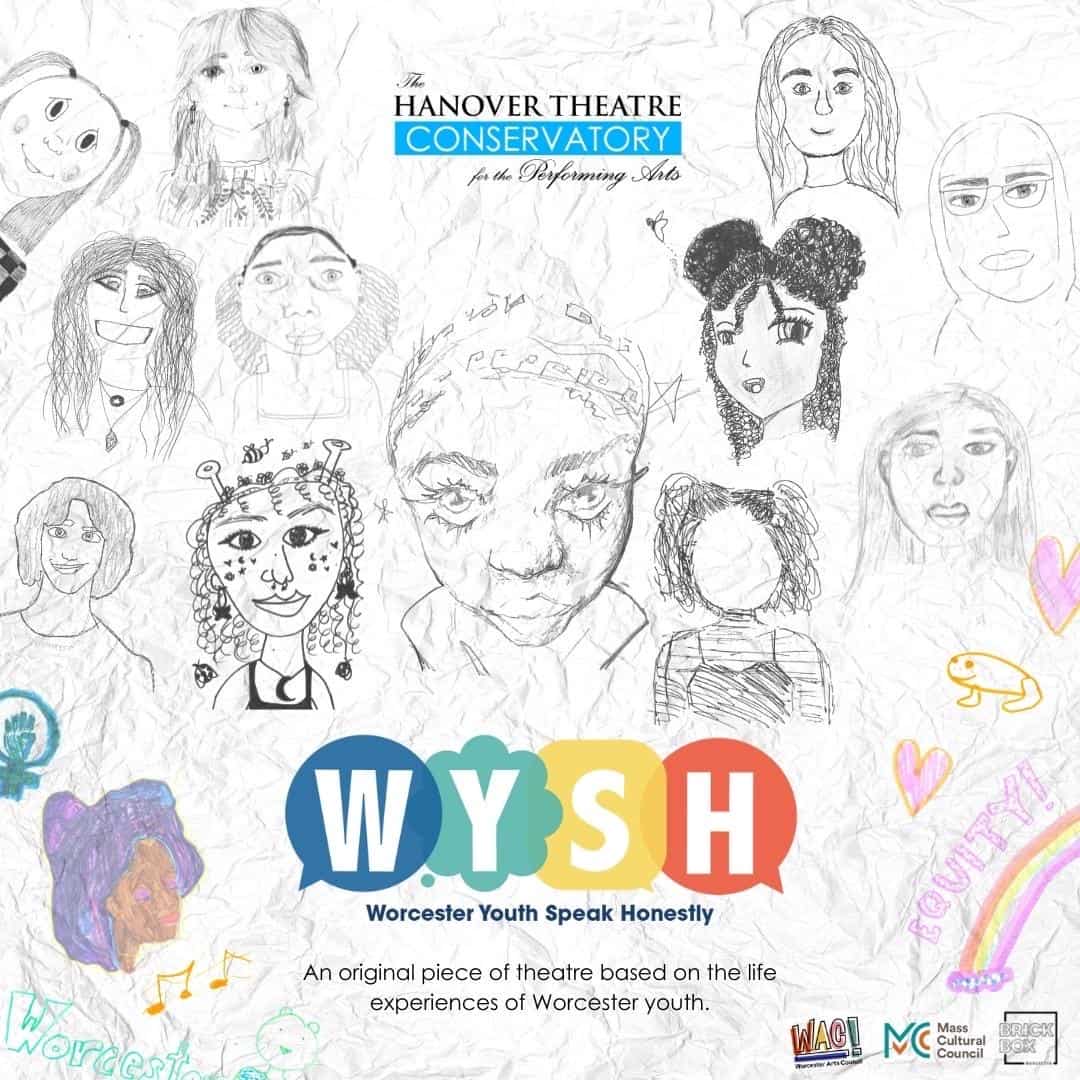
Ashleigh Prince spoke with Sharon Hart, the director of conservatory operations at The Hanover Theatre Conservatory, about the WYSH project and more! Read on for highlights from the interview, or listen to the full interview below. Tune in to Talk of the Commonwealth with Hank Stolz on WCRN 830AM Fridays at 9 AM and Saturdays at 1 PM for more behind-the-scenes interviews.
Ashleigh: Hello, everyone! Welcome back to Behind the Scenes at The Hanover Theatre. This week, we are checking in with the WYSH Project. Today, we’re speaking with Sharon Hart. Hello, Sharon!
Sharon: Hello!
Ashleigh: For the people that are listening that might not be familiar with you, let’s start with your role at The Hanover Theatre Conservatory and how you got started with WYSH.
Sharon: My title is the director of conservatory operations, so I keep things running here at the Conservatory. I’m also a teacher in the Conservatory and I teach a number of acting classes, and I am also the director of the WYSH Project, which stands for Worcester Youth Speak Honestly.
Ashleigh: I just took a trip last week to see your children’s summer program performance, and it was so cute. I feel like you bring such a great energy to these programs and classes, so I’m really excited to speak with you today about WYSH.
Sharon: Thank you so much.
Ashleigh: Of course. Now, I’m no stranger to WYSH. I was helping you with the project last year when we developed a logo together and I helped them promote their show on social media. This year, things are a little different; we have a new crew and the show is a little different, so let’s talk a little bit about that. How does this year’s production of WYSH differ from last year’s?
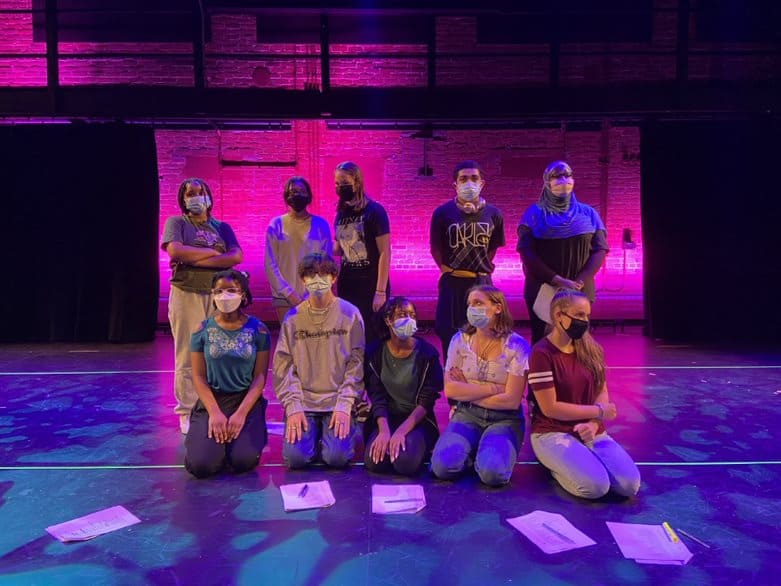
Sharon: First and foremost, last year was our first year so it was sort of a pilot program where we were trying to just feel things out. The process was a little bit different; we did a lot more writing than we did this year. However, this year we have a lot more content. We added more time because we knew that we ran out of time last year, so we added about an additional 30 hours to the program which has really helped. This year, we have 12 kids and last year, we had 11. They’re all Worcester youth and they all heard about WYSH through different channels. We do have five students who are returning from last year, and some of them talked it up to their friends and got them to join. We did a WYSH tour in February, so we went to three of the different Worcester public high schools, performed the show and gave people the opportunity to come and join based on what they saw. Then, we had a sample workshop in March to give kids the opportunity to see what it was like and what it was all about. From there, we signed them up, so we ended up with 12. We’ve been working since the end of April to create the show. Every week, we have a theme, a prompt or something for them to think about or discuss.
A lot of times they’re writing in a journal, we have conversations and we just talk about stuff and flesh it out; sometimes it’s personal stories, sometimes it’s opinions about things that are happening in the community or the world. Based on that, they create theatre.
Sharon Hart
Sharon: It might be a scene based on oppression that they witnessed or experienced in school. This year, we have a story about homophobia. We have a number of students who identify as LGBTQIA+, and one of them tells a story about some homophobia that they experienced in school. That got turned into a scene and they get to talk about what they would have done if they had been able to pause in the moment and all the things they would have said. There is a real emphasis on social justice issues, which is a little bit different from last year; we focused a lot on identity last year. This year, with the expanded amount of time, we’ve really had time to dig into some more social justice issues. There’s a whole segment about toxic gender roles and a number of students who experience the effects of that. We have some scenes around sexual consent and people that deal with that. We still have that identity piece because that is a necessary component to the program, giving the students the chance to experiment and explore with the idea of who they are, the things that are important to them and who they are as a group. Although there are 12 individual students, they are also a pretty tight community and ensemble. We really try to go back and forth between monologues, scenes and group pieces, so that you really get the full sense of what they have to say. They have individual stories, but then they also have group stories as well.
Ashleigh: How many people from the previous WYSH Project performance are coming back for this one?
Sharon: There are six people returning.
Ashleigh: So, around half of them are WYSH veterans which is great. I had the pleasure of watching a few rehearsals so far and the show is very different from last year. I really loved last year’s, and I think I’m going to love this year’s as well. You have a really great and very talented group of students, and I’m really excited to see them lit up on the stage in the BrickBox. I think it’s a great venue for this project. This is an intimate show and I think that it’s just great all around. I want to go back into what the WYSH project process is like. You’re developing all these scenes and movement pieces, but where does that all begin? How do you start with that idea?
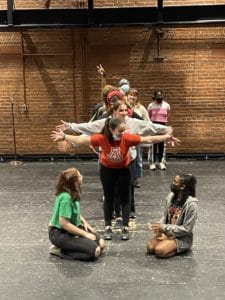
Sharon: I built the curriculum this year thinking about the stuff that we did last year, because it was apparent that there was a real need for these students to spend some time thinking about who they are and the things that make them who they are. Unless they’re in therapy or writing on a regular basis, it might not be something that they have the opportunity to do. That’s the beginning; we always start with stuff that’s really centered around the self. This year, we had them create a timeline of their lives with all the highlights and milestones from birth to now, and the things that make up their life. From that, they chose a defining moment that changed them. We spent 90 minutes to two hours helping them refine those stories down to two minutes. They started by writing about it, then they started working in small groups talking and telling their story.
Sharon: We did a whole exercise where they stood in two lines and they just kept telling the story over and over again, trying to get it to two minutes and focusing on the highlighting the important pieces of it. We have a couple of those stories that are part of the show, and then we broadened the scope. We had them start thinking about a time that they experienced oppression or witnessed oppression, and then we dramatized scenes from that. We did a couple of other exercises that got out us talking about things such as, how do we measure success? What are the pressures that teenagers feel today? We have a couple of pieces that derived from those conversations and those exercises. We do record everything on an iPad so that we can go back and watch it, because there is a lot of stuff that happens. We pull out the stuff that worked, resonated or seemed important. We continue working it, reworking it and reframing it, and from there, we put everything together into a script. It’s not like a normal script where there’s necessarily characters and parts, but it’s stuff that that they’re familiar with and that they’ve been working on all along. We don’t necessarily have a through line and we don’t have it organized at the beginning. This year, that through line is their vision for the world. People come out and talk briefly about their vision for the world. It’s all very positive and hopeful stuff. The show does focus a lot on the problems that they see, the oppression that they’ve experienced and other things that they’ve experienced. At the end of the day, the message is that they really feel empowered to change the world, and I think they’re going to.
Ashleigh: Absolutely. I really liked those giant notepads that all the students had done with different word prompts and all the artwork that they drew. Seeing that really was inspiring me as someone that’s helping them to promote their show. If anyone sees the posters or any of those graphics around the city or on social media, those are actually developed by students in the program. They all drew self-portraits and they provided all the artwork from all the drawings and doodles that are incorporated into it. I think that it just makes it more special and more personal, which is what WYSH is all about, right? It’s about expressing yourself and conveying what it means to be a youth in Worcester.
Sharon: Although this piece is facilitated by adult teaching artists such as myself and Deborah Kronenberg, this really is like a very collaborative process. It’s all of the students’ words in their stories, and they have a lot of input. They make a lot of suggestions; if there’s something that doesn’t feel right to them, they’ll speak up and say, “We’re not really sure about this. We’re not sure why we’re doing this or why this is happening.” They have full authority to do that. Our job as facilitators is really to just support them, to keep them focused and on track and to direct the piece, because that is difficult for anybody to do who’s outside of it. It continues to be a very collaborative process where they feel very empowered to make the show their own. When we spoke with them about their takeaways from the program last year, that was something that we kept hearing. They mentioned just how important it was for them to feel so empowered, because they’re used to being involved in theatre projects where they’re just being told where to go and what lines to say.
Because WYSH is so organic, the students are a part of it from the ground up. They have a lot of ownership, a lot of attachment and a lot of pride in the process in the final piece that they ended up performing.
Sharon Hart
Ashleigh: I spoke to a bunch of students that are in the program to ask them what WYSH means to them.
WYSH Student: WYSH is like a therapy place where you can find yourself and just get to be yourself without anybody judging. You get to learn more about who you are and what you want to do in life. It’s like a safe place.
WYSH Student: WYSH means a lot to me because it gives me a space where I can talk about how I feel and not feel judged.
WYSH Student: To me, WYSH means expressing myself. Through this program, I’ve learned a lot about being able to express myself. WYSH means a lot to me because I’ve made so many friends here and I’ve done so many things that I never thought I would do.
WYSH Student: WYSH means a community, it means diversity and it means strength.
WYSH Student: WYSH is the most meaningful program I’ve ever been a part of. The fact that myself and my peers are given a platform to speak on issues that we face in the world is not to be understated. Also, I am so grateful for the amount of friends that I’ve made that I know that I’ll keep for life.
WYSH Student: What WYSH means to me is a crazy, wacky place where you can be crazy and wacky but also, you can act and be very woke, which is four things I really love to do put into one. Come on down to The Hanover Theatre Conservatory and enjoy WYSH.
Ashleigh: With WYSH, I know that there is a whole lot that goes into it. Let’s talk about the big players in this program. You have obviously the Conservatory and the faculty that support it, but who else is involved here?
Sharon: We’ve had a lot of support from the Worcester public schools. Sue O’Neil, the prior assistant superintendent came to see the show last year, and she was so moved by it that she invited us to come and perform at the schools this year. We ended up doing that and it became a way for us to recruit new students. The support and our partnership with Worcester public schools is really critical to a lot of the work that we do and a lot of our programs, and this has been no different. We also have received funding from a couple of local arts organizations. The Worcester Arts Council and Massachusetts Cultural Council are funding this project as well as the Greater Worcester Community Foundation. That has really helped us. It is an expensive process, but everything is free for the students. We also provide food at every meeting that we have, and we’ve actually had some donations of food. Volturno has given us pizza a couple of times during the program free of charge, which has been really amazing and really helps ease the burden of feeding 12 hungry high schoolers. The opportunity to work in the BrickBox has been great. It’s an amazing space and it really, really works for this piece, as you mentioned, because it’s an intimate setting. The performances are also free to the public. Last year, we had a number of people who just randomly showed up; they didn’t even know anybody in the show or really know what to expect, and they were equally moved by it.
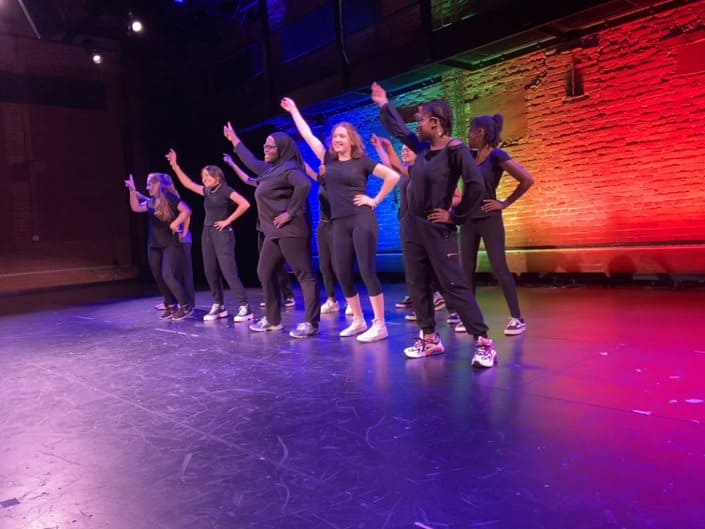
Sharon: We’re very grateful for the opportunity to perform in the BrickBox this year again, and our partnership with them and the JMAC. The staff is awesome and it’s a real pleasure to work over there. After each of the performances, we do at talkback. For anybody unfamiliar with what that is, we basically open up the floor and let people in the audience ask the cast members or directors questions about the play and the process, and they really get a chance to talk about it. That’s a really important piece of the program. They don’t necessarily get a lot of time to reflect on it or to even get feedback from people outside of it, so this is a really cool aspect of the program because they get to hear from their community that they’re a part of and that this is for. Last year, that was also really powerful and it was really special for them to have people, adults mostly, talking about how their stories and their words had resonated with them. I think they really started to feel just how powerful the medium of theatre is, especially this type of medium and this type of theatre where it’s sort of fused with social justice and they’re really speaking out about the problems they see in the world, the things that need to get fixed and their visions for the future.
Ashleigh: I brought my former high school drama director to see WYSH last year because Worcester kind of reminds me of Southbridge in some ways, and I just felt like sharing this project with her would be really fun. She ended up loving it and she was talking about wanting to make her own version of the WYSH Project for our community. It is having ripple effects on everyone that comes to see it, everyone that experiences it and everyone that’s in it. I think it really is a great project and it’s so special to me that it is free for the students that participate and free to attend. I think that if I was still in high school and this program existed and I was in Worcester, I would love it. I would be so excited to show up every week and work on this very important and special piece of theatre.
Sharon: I think from what we’ve heard from the kids, that’s exactly how they feel.
They have a lot of pride not just in the final product, but in the process and the fact that they’re so instrumental in it. It has some deep, profound messages, and it tackles some things that aren’t easy to talk about for anybody, especially this year. I think that it takes a lot of courage to do that.
Sharon Hart
Sharon: They especially felt that when we went to the public schools. We had students talking about the administration of their schools and things that they wanted to see changed. I think it really hit home just how powerful that is and how scary it can be to speak truth to power. However, I think it was super empowering for them to do it and for them to have a cast of people supporting them behind them as well. We are planning to do that again this year, and hopefully we can reach even more schools and recruit more kids for WYSH Project 2023.
Ashleigh: The WYSH performances this year are July 15-16 and there are three performances that you can catch. Head to TheHanoverTheatre.org or visit our socials to learn more. You’ll have plenty of plenty of opportunities to connect with us and see this incredible show. Sharon, if people are listening right now and they’re interested in joining the WYSH Project or recommending the WYSH Project to someone that they love, what is that process like? How do you go about that?
Sharon: Because we’re still in the midst of this year’s, I’m just collecting people’s email addresses and will be reaching out, probably in the fall, to start setting up the times and dates for next year. Everything will probably kick off with a sample workshop in March, which gives kids the opportunity to see what it’s about, see if it’s for them and meet other people that are doing the project on. Again, it runs from April through July. Anybody who’s interested can email me at [email protected], and my name is also on all things connected to the WYSH Project on the website.
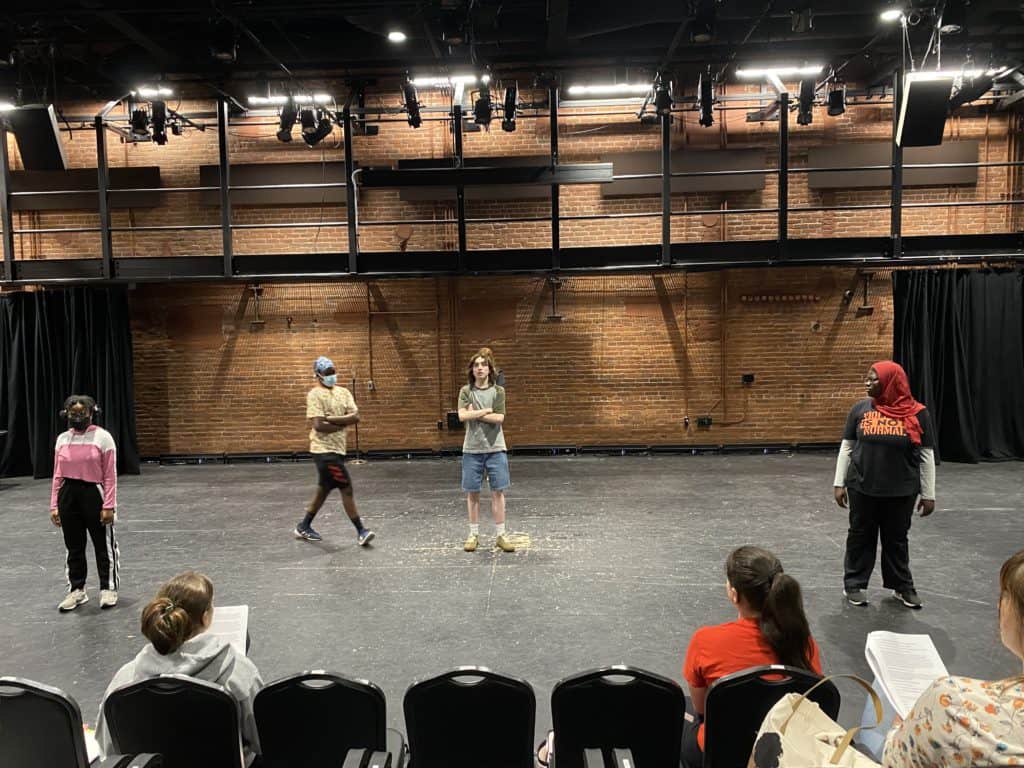
Ashleigh: Yes! You can also shoot us a message on Facebook, Instagram, Twitter and LinkedIn; I keep an eye on all of our platforms. If you are interested in the WYSH Project, I can forward your message along as well. This has been an excellent interview; do you have any parting words for our audiences today?
Sharon: Come see the WYSH Project, you won’t be sorry. It will impact you and it’s free so you’ve really got nothing to lose. It’s about 50 to 60 minutes with the talkback afterwards. It’s a great thing to do and we’d appreciate the support. We look forward to seeing you there.
Ashleigh: I saw the last one about a year ago and I still think about it very often. I encourage everyone to come and see this WYSH Project. Find your tickets today at TheHanoverTheatre.org. We can’t wait to see you there. That concludes this week’s episode of Behind the Scenes at The Hanover Theatre, we’ll see you next week.
Sharon: Thanks, Ashleigh!
Ashleigh: Thank you.
